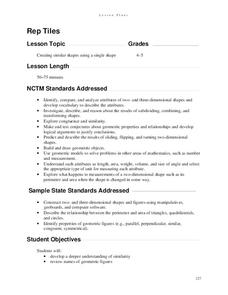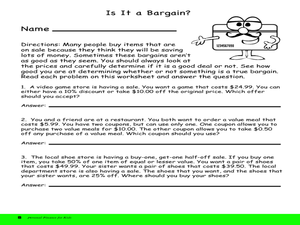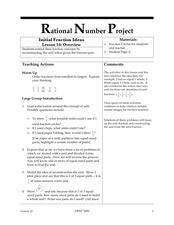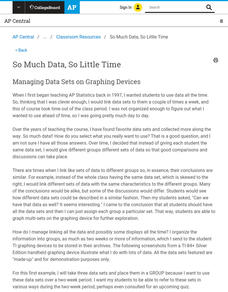Curated OER
Choral Counting II
Using a number line or a 100s chart that extends past 100, practice counting from 1 to 120 with your class. As a part of daily instruction, chant count in sequence from 1 to 100 and then randomly chose a number and count onward to 120....
EngageNY
The Opposite of a Number
It's opposite day! The fourth installment of a 21-part module teaches scholars about opposites of integers and of zero. Number lines and real-world situations provide an entry point to this topic.
Improving Measurement and Geometry in Elementary Schools
Rep Tiles
In addition to the catchy title, this lesson plan provides upper graders an opportunity to more closely scrutinize the attributes of plane figures. In particular, they focus on the similarity of different shapes. Both whole-class and...
Curated OER
How Do You Spend Your Money?
Fifth graders examine ways to save and spend money. They look at ways that people earn, save, and spend money using chapters from Tom Birdseye's Tarantula Shoes. They add and subtract decimals to fill in a worksheet entitled, "Is It a...
DK Publishing
Sets
Do scholars understand multiplication as sets of numbers? Help them grasp this concept through groups of objects arranged as a makeshift multiplication number sentence. They examine the sets and fill in boxes to indicate how many sets of...
Illustrative Mathematics
Rational or Irrational?
Is 4 plus the square root of 2 rational or irrational? After your class has gained a basic grasp of rational and irrational numbers, use this worksheet to push them a little further in their understanding. Learners must identify sums and...
El Paso Community College
Factoring
Factoring polynomials is an important skill through high school math and beyond. It provides instructions for the basic types of factoring and a practice set with an answer key.
Curated OER
Penny Basketball: Making Sense of Data
Explore four web-based interactive sites to develop a baseline understanding of statistics. Learners play a series of penny basketball games and collect data regarding their shooting statistics. Groups decide who is the "top" penny...
Curated OER
Addition Word Problems 1, Version 1
In this addition worksheet, students solve word problems containing one and two digit numbers. Students complete 5 addition word problems.
Curated OER
Initial Fraction Ideas Lesson 16: Overview
Kids will compare creating fractions from pieces of paper to chips. They begin with a fractional part and work back to a whole. Then order fractions from smallest to largest. They also complete a worksheet to find the missing pieces to...
Curated OER
More Complex Fraction Problems
If your fifth graders have mastered fractions, push them to the next level! They multiply fractions by whole numbers and decimals (in the form of money math). The worksheet provides space for pupils to write out their work, based on two...
DK Publishing
Real-life Problems, Working with Fractions
Test your fifth graders' math skills with five word problems involving fractions. After studying two examples at the top of the page, pupils multiply fractions by whole numbers to solve each word problem. The worksheet provides two...
Curated OER
Solving Problems Involving Subtraction
Here is an excellent lesson plan on solving subtraction word problems using fractions and mixed numbers. Learners complete three activities that will help them to explore and better-understand the world of mixed numbers. Fraction bars...
Pickle Bums
Catch a Bug Game
Young mathematicians bottle up colorful bugs as they learn to sort and count objects. With six different colored jars and six different colored bugs, children must place the creepy crawlers in their respective containers and see how many...
Curated OER
Pick A Number
Elementary schoolers find out which month has the most class birthdays (mode) and which birthday represents the middle point of all the birthdays (median). They gather and organize data to find one number that fairly represents the whole...
Curated OER
How Far Can You Jump?
Students estimate the distance of student's broad jumps. This activity can take place in the block center with a small group of students. They are explained that they are going to jump from a starting point (marked with the masking...
Curated OER
Division by Fractions (Part Two)
Investigate division through the use of array models. The lesson focuses on using area models to compare division as sharing with division as grouping. Young scholars evaluate the usefulness and limitations of the two array models.
Curated OER
How Many Raisins?
Young scholars study the concept of addition. They create verbal number stories with numbers from one to five. They draw a slice of bread with a line down the middle and cut the bread shapes out of a "slice of bread" and a handful of...
Curated OER
Learning to Multiply
Learning how to multiply is the focus of this math resource. The first of five pages reviews the multiplication process as repeated addition. The second provides a few examples that you might consider working through with the class. An...
Illustrative Mathematics
Harvesting the Fields
This problem involving rates may look simple at first, but it is actually quite challenging. Two different sized fields are harvested by a team of workers and learners must use different rates to calculate the number of workers on the...
Curated OER
More and Less Handfuls
Working as a pair, two kindergartners will sit at a table and will pick two handfuls of counters. They will combine their individual handfuls into one, and count their own selection. They will then draw and record their count on a record...
College Board
So Much Data, So Little Time
Organizing data in a statistics class is often a challenge. A veteran statistics teacher shares data organization tips in a lesson resource. The instructor shows how to group data to link to individual calculators in a more efficient...
Curated OER
What's Next?
Teach the class how to continue a given number pattern, and have them state a rule to explain their answer. Arithmetic sequences and related worksheets are used to reinforce the concept of numerical patterns using the nthterm.
DK Publishing
Finding 5 - Multiplying by 5
Visualize multiplication facts using rectangular arrays. Scholars multiply single-digit factors by five and represent each number sentence using sets of dots. They circle the groups of five and fill in missing parts of the equations....

























